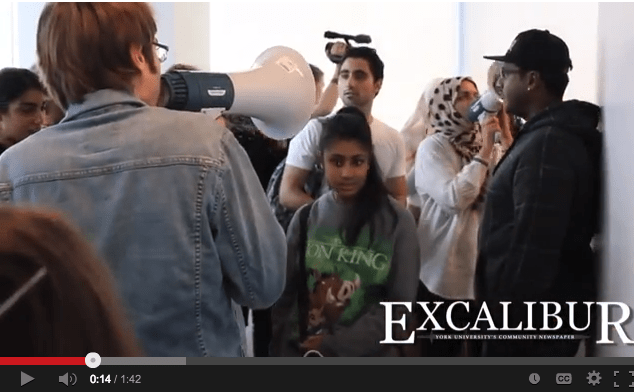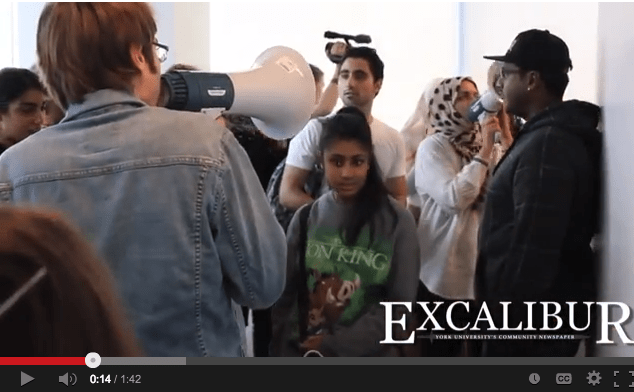
A group of students protested outside a Board of Governors’ meeting on September 30, chanting and banging on the doors after they were not allowed to enter the room where it was being held. The group, consisting mainly of members of Students Against Israeli Apartheid, wanted to add an item to the meeting agenda, but was refused because it hadn’t given advance notice.
Although SAIA didn’t request to attend in advance, the Board offered to allow four representatives to come in and observe the meeting. They would not, however, be permitted to speak or present their demands as they were not on the agenda.
Members of SAIA, joined by non-member supporters and allies from the York University Tamil Students Association, United South Asians at York, and the Socialist Fightback Club, yelled for President and Vice-Chancellor Mamdouh Shoukri to come out of the meeting.
“Shoukri, Shoukri, you will see, Palestine will be free,” chanted the protesters, screaming “Shame” at the board, who continued the meeting inside, and at Rhonda Lenton, vice-provost academic, who came out to mediate the situation.
SAIA members weren’t happy the last time they were allowed into a BOG meeting. In July, although they requested to attend in advance and had an item added to the agenda, they were stopped from reading the entirety of the text they had prepared as the Chair requested to hear only the first page, which she felt contained the essence of the message.
“Because they didn’t actually listen to us, this time we thought we’re just going to go in and they have to listen to us,” says Arshiya Lakhani, a media spokesperson for SAIA. “We’re asking for them to come to discussions with us about policy amendment,” says Lakhani.
“There are policies in the Student Code of Conduct that are undemocratic and that don’t allow students to voice their concerns.”
The group intended to present a list of demands to the Board, including the lifting of sanctions against SAIA and York alumnus Hammam Farah. The club’s status was revoked following a rally held in Vari Hall in March, which the university says caused an academic disruption.
SAIA is also asking for the amendment of three university policies: the Temporary Use of University of Space policy, the Code of Student Rights and Responsibilities, and the Senate Policy on Disruptive and/or Harassing Behaviour in Academic Situations. The group wants the university administration to become “more accessible and accountable to students,” and for Vari Hall become “more conducive to student expression as it was designed for students to hold demonstrations,” says Lakhani.
Lenton, who came out of the BOG meeting to speak to the protesters, says it was simply not possible to have an open discussion on the issues the students were raising at “the spur of the moment.” “That’s challenging for a board that has a full agenda with a lot of university business to get through,” she says. “It’s not a reflection that the issues being put forward by the group of people are any less important.”
The board only meets five times a year for a couple of hours, she explains, and usually with a packed agenda on the business of the university.
Because of noise from the protest, the Board of Governors eventually switched rooms within Kaneff Tower.
While Lenton offered to bring documents from SAIA into the meeting and have them filed in the minutes, representatives of the group insisted instead on a discussion with the Board’s members.
Lenton says although senior academic administrators at York are willing to openly discuss the issues raised by protesters, there are fundamental disagreements in their perspectives with regards to freedom of expression and disruption of academic activities. “The limits we have on us is our fundamental responsibility to ensure students have access to their learning, that they can complete their courses and exams,” she says.
“What they’re doing is essentially undemocratic,” says Lakhani, adding that the club will use other avenues to ensure their demands are met. “It might be a very long process, but we’re willing to go through it.”
Tamara Khandaker
Editor-in-Chief





